
Hey Boys & Girls, it's Bollywood meets Wuxia in Chandi Chowk to China. We sat down with Indian cinema superstars Akshay Kumar, the gorgeous Deepika Padukone and director Nikhil Advani to discuss the film’s historic worldwide release.
Namaste, y’all
Chandni Chowk to China
Director Nikhil Advani, Deepika Padukone, and Akshay Kumar
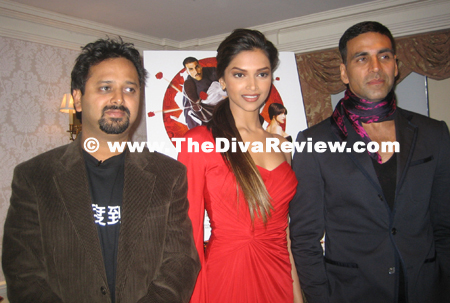
Q: Can you tell those who may not be familiar with Bollywood films what the title of the film means?
Nikhil Advani: Chandni Chowk to China: There is a saying that the heart of India is Delhi and the heart of Delhi is Chandni Chowk. Chandni Chowk is an area. Which is the most congested area in New York?
The Lady Miz Diva: Times Square.
NA: Times Square? So, Chandni Chowk is Times Square gone about 10,000 times. It’s the center it’s the heart of Delhi.
LMD: It’s like a market, isn’t it?
NA: It is a trader’s market. The second largest trader’s market in the world.
Q: Were you a martial arts film fans before making Chandni Chowk to China?
NA: I’m not a guy who will go out and pick up a Chuck Norris film, or a Van Damme film, or Steven Segal. I’ve watched all of Bruce Lee’s films. I mean Kill Bill and Bruce Lee and Jackie Chan, I’ve done all that, but everybody has. Jackie Chan is a huge star, you know? So, for me the first idea working with Mr. Akshay Kumar was that you have to come every morning to my house and I’m gonna make you see martial arts films.
 Deepika
Padukone: I watched
couple of films once I decided to do this film. Nikhil wanted me to
watch films like Kill Bill and Elektra to get the look of the action, and
the way girls do action is obviously different from the way guys do
action. So, I watched a couple of films then, but the most important
thing was the training that I went through.
Deepika
Padukone: I watched
couple of films once I decided to do this film. Nikhil wanted me to
watch films like Kill Bill and Elektra to get the look of the action, and
the way girls do action is obviously different from the way guys do
action. So, I watched a couple of films then, but the most important
thing was the training that I went through.
I trained for about 6 months before we actually started shooting and our action choreographer Dee Dee, who is based in Hong Kong, he came down and he sent some of his people to train me. I think that’s what helped me a lot.
NA: The funny thing is that we met McG yesterday. And he saw the poster, he said, “That reminds me of somebody.” I said “Yeah, Lucy Liu, yes.”
Q: How did Chandni Chowk to China come into being?
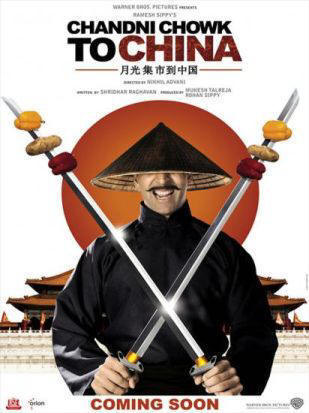 NA:
The producer of the film is a very good friend of mine and we talking
for quote some time of doing something together. He had already
collaborated with the writer of the film on two other occasions; they
had come up with the idea. They went and met him {Akshay
Kumar} and they
showed him a poster of the film where he’s standing with two samurai
swords that are more like shish-kabobs.
NA:
The producer of the film is a very good friend of mine and we talking
for quote some time of doing something together. He had already
collaborated with the writer of the film on two other occasions; they
had come up with the idea. They went and met him {Akshay
Kumar} and they
showed him a poster of the film where he’s standing with two samurai
swords that are more like shish-kabobs.
Akshay Kumar: I looked at the poster and I asked, “What’s the script like?” He says, “There is no script.”
NA: “I don’t have a script.”
AK: “What’s the idea?”
AK & NA together: “I don’t have an idea.”
AK: “So, what do you have?” “Well, I just have this poster.” “Do you know that when you approach an actor, his requirement is a script?” He said, “I know that, but I don’t have it.” I said, “Congratulations, this is a new way of working. I really like the poster and I’m gonna work on your film.” He says, “Great!” You know sometimes when you go on an airline or something and you’re watching all the films? So, you see the poster, you don’t even know what those Chinese films are, but you just like the poster and you say, ‘Okay, let me watch this film; the poster looks interesting.’ Or you even buy CDs because the poster is very good. So, that’s what exactly what happened with me. Then later on they started making the script, then later on they started getting the whole idea together and I quite liked it.
LMD: I understand there are some autobiographical aspects to the script, Akshay, did you actually become a Kung-Fu Master before you turned to acting?
AK: Oh, I became a Kung-Fu Master! {Laughs} No, no, no. I thought I was very good at it. I thought I knew martial arts until I met these Chinese dudes; they’re really amazing, they’re so fast, and I realised how slow I was and then absolutely from the first day onwards I had to start practising with them and try to at least come up to their level slowly, slowly.
NA: But, I mean, you’ve got Gordon Liu in the film, he’s the first Shaolin monk. He’s the 36th Chamber of Shaolin.
 AK:
He’s the Master Killer.
AK:
He’s the Master Killer.
NA: Akshay’s shooting with me the entire day and he says at the end of the day, “You didn’t introduce me to Gordon Liu.”
AK: He didn’t introduce me!
NA: “I got into martial arts because of this man and you didn’t introduce me.” I said, “But you just shot with him the whole day, you could’ve just gone and said, ‘Hello, I’m Akshay’.” He said, “Yeah, but you didn’t introduce me to Gordon Liu.”
AK: Isn’t that the right thing?
NA: “You just don’t approach Gordon Liu!” His whole thing he’s acting like a schoolboy in front of Gordon Liu. And Gordon Liu is fantastic, super. Have you seen the film?
AK: I’m sure everybody has seen The 36th Chamber of Shaolin!
NA: No, if they have seen Chandni Chowk to China.
AK: Oh! Oh, I’m talking about 36th Chamber.
Q: Can you talk about filming in China?
NA: It’s very, very, very difficult because you have to submit the script to the government they have to go through the script, they will decide. And we were very, very sensitive about the cultural difference, ‘Are you actually in any way stepping {over} the line.’ It’s a very delicate situation, but having said that, once they gave us the permission to use the Great Wall, then, I mean, we’ve got people jumping off the Great Wall, we’ve got people flying all over the place. They really allowed us to do a lot of things.
As far as language, we had a Thai crew, we had a Chinese Mandarin crew, we had a Chinese Cantonese crew, we had an Indian crew, and there was chaos! But that’s what filmmaking, is about. We got by with lots of gesticulating…
DP: Sign language!
NA: Lots of sign language, lots of talking loudly as if the person is deaf. Lots of that happened. I remember Akshay had a driver, his chauffeur – he kept calling me, he said, “Why is it that I have to be given the one chauffeur who doesn’t know the way to get to the location?”
AK: I used to always reach {the location} late.
NA: And he hates being late! So, he said, “Why is it?” And the worst thing was that he would not take him back home. He even got lost taking him back home. He said, “Tomorrow, I’m coming in late, I’ve just been through two hours of going round and round!” These are the things that we remember and it was great fun making this film.
Q: What was the most challenging aspect of making the film?
NA: The schedule, it was a relentless schedule.
AK: We had about 15 days work on the Great Wall of China, but we only got permission for 7 days. So, 18 hours we used to work.
NA: You’ve seen the climax of the film where finally he gets the epiphany, he gets up, he takes on Gordon Liu? I remember how we shot it; I was shooting in one location on the set, another unit was shooting location, Akshay was changing clothes, going over there, coming back.
The schedule was relentless; it was being away from or families for 89 days. I remember the last week; we actually tried to pull a fast one on the entire crew and said, “Akshay has given us more days. We wanna complete the entire film now so we’re gonna be another 15 days.” It was chaos! “We wanna go home! We wanna go home!” I was like, “Calm down, calm down.” It was like shooting Lord of the Rings.
Q: Which was more difficult, the dance moves of the martial arts?
AK: For me, dancing.
 DP:
For me, martial arts.
DP:
For me, martial arts.
AK: I’m actually shocked that she said that, but for me the dancing was the more difficult.
DP: But you’re a brilliant dancer.
AK: If you actually look at it, it looks as if I’m doing aerobics. Okay, so that’s not dancing, what I do. I actually just follow the choreographer.
DP: I think the fact that I learnt Indian classical dance when I was younger, that kind of helped me do martial arts a lot more easier. I think somewhere dance and action go hand-in-hand, because martial arts, when you do action it’s like treating it like a dance and it should be extremely graceful. So some way the dance that I learned really helped me a lot.
 LMD:
You mentioned Kill Bill and that you’d seen some Bruce Lee, but I’m
seeing a lot of cues from other films here like Jackie Chan’s Drunken
Master and Kung-Fu Hustle by Stephen Chow.
LMD:
You mentioned Kill Bill and that you’d seen some Bruce Lee, but I’m
seeing a lot of cues from other films here like Jackie Chan’s Drunken
Master and Kung-Fu Hustle by Stephen Chow.
NA: Lots of Stephen Chow, lots of Curse of the Golden Flower, Mr. Ang Lee, Lust, Caution.
 LMD:
Lust, Caution?
LMD:
Lust, Caution?
NA:
Well, we have the entire song sequence where she is dressed in the
cheongsams; we had the other girls in the cheongsams.
He is dressed in that whole 1920’s, 1930’s style of occupied China.
So, we’ve done all that. We’ve shot in the same street that Mr. Ang
Lee shot Lust, Caution in. We have the same cars going in
the background and we have the golden flowers.

So, we have Zhang Yimou’s golden flowers. There were strong tributes to these great masters of Chinese cinema. There’s also great tributes to masters of Indian cinema.
The producer of the film is Ramesh Sippy, who has made a film called Sholay, which is the all-time great Indian film. The story of Sholay is a village is being persecuted. One of the leaders of the village goes to find two criminals to protect the village which is Chandni Chowk. His other film is twins being separated at birth here we have. What Akshay likes to say, “It’s a Bollywood Marsala film,” and we’re just giving tributes.
LMD: And Akshay, were there specific films you used to inspire you while training for the role?
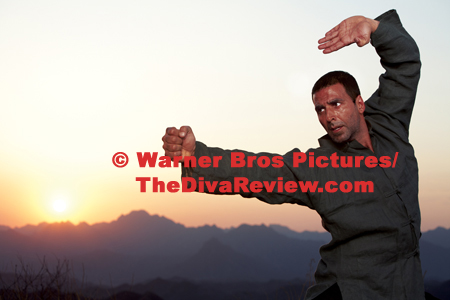 AK:
Every morning me and him I used to call him at 6:00 in the morning at my
house, we used to watch every Chinese movie. I think 50-55 movies we
have seen.
AK:
Every morning me and him I used to call him at 6:00 in the morning at my
house, we used to watch every Chinese movie. I think 50-55 movies we
have seen.
NA: Don’t ask me! He would say, “Look at this guy, look at how he does that.” I’d say “What has he done?” He’d say, “See that? The way he’s broken the walnuts” I’d say, “Okay it’s wonderful.” “Look, we ought to have that in the film.” “Yes, we’ll have that in the film.”
AK: Quite a lot of things I used to force him to do. I used to use my star power on him!
LMD: Akshay, this character being a chef has some meaning also, doesn’t it?
AK: Me being a chef? In my real life, I’ve been a chef, so it was very easy. To play this character was very, very easy for me.
NA: The title came from Akshay.
AK: I’m born in Chandni Chowk, so this character was in Chandni Chowk. First they were gonna call the film Made in China, so then we shifted to the title called Chandni Chowk to China.
Q: Deepika, was it a challenge to play a twin?
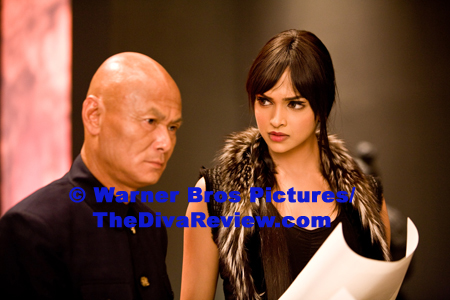 DP:
Extremely challenging, a) for the fact that both the characters are
completely different from the kind of person that I am. And b), you
know on certain days we would have location only for a limited period of
time and I would have to do both the looks.
DP:
Extremely challenging, a) for the fact that both the characters are
completely different from the kind of person that I am. And b), you
know on certain days we would have location only for a limited period of
time and I would have to do both the looks.
So, I would quickly do one look, then I am back to my van, change makeup, change hair, change everything, go back, do the other look. And sometimes I would have to do that 3 or 4 times, over and over again because when you have a location only for a couple of days and we have to finish both the things.
LMD: Deepika, did you do your own stunts during that big fight scene in the airport?
DP: Yes, that was all me! {Laughs} It was very challenging.
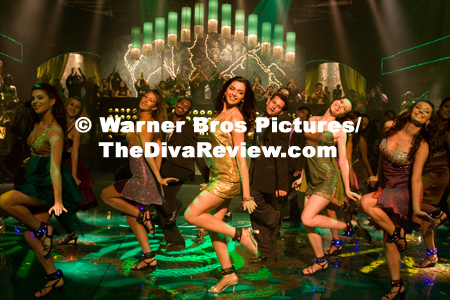 LMD:
Chandni Chowk to China is historic moment for Indian filmmakers as it’s
the first Bollywood picture that has a major international distributor
in Warner Brothers behind it. What do you feel it is about this film
that makes it ready for to conquer a worldwide audience?
LMD:
Chandni Chowk to China is historic moment for Indian filmmakers as it’s
the first Bollywood picture that has a major international distributor
in Warner Brothers behind it. What do you feel it is about this film
that makes it ready for to conquer a worldwide audience?
AK: You see, when we make a Bollywood film, we make a film which has comedy only, or a film that has action, it’s a mobster, or romantic. But this film has all together everything mixed together, and if anybody wants to, we want to give a few word answer of what’s a perfect Bollywood film? I would say, ‘Okay, this is a DVD - not pirated, though – this is a DVD of Chandni Chowk to China. Watch this; this is what Bollywood is all about. Everything is there.’
 Q:
So in India, you’re expected to play all those different styles of film?
Q:
So in India, you’re expected to play all those different styles of film?
DP: This is my third film.
NA: And she said to him {Akshay}, “Oh, I grew up watching your films!” {Laughs}
AK: Don’t ask me how many films I’ve done…
Q: How many films have you done?
AK: 120.
DP: See? So, 120 and 3!
AK: I finish about 4 or 5 films in a year.
DP: I think he’s one of the only actors in our country who can manage to do 4 or 5 films a year and put in more than 100% percent into every film that he does.
NA: You’re already doing the next film with him, don’t encourage him.
DP: {Laughs}
 Q:
Have you ever made two films at a time?
Q:
Have you ever made two films at a time?
AK: Yeah, yeah, of course. Two films in a day! Morning, 7 to 2 and from 2 to 10 another film.
NA: Eventually when we shot the film, we edited the film, I saw the film, I said, “Listen I wanna take some more shots, I wanna do something else.” They said, “We don’t have Akshay Kumar’s days, we don’t have Akshay, what are we gonna do?” I said, “Well, I’ll go speak to him.” And he said, “Yeah, yeah, yeah, don’t worry, I’m shooting with this film, but you just set up; I’ll just finish the shot, then I’ll come and do that.” He needed to be, we had to do that.
AK: I’ll tell you, everything will boil down to one thing; see, when we make a Bollywood film, the budget is not as high as a Hollywood film. Let me be honest, that’s how it is. We have made this film on about 7 to 8 million US dollars. This kind of production will have that much budget because we can’t exceed that much, because we don’t have that much reach to other people. We are trying our level best to do that.
NA: We’re trying to cross over. We’re trying to cross to audiences so that we can.
AK: So, that’s the whole idea to get this movie across. So that the budget also increases so we can make good films. I met a few Hollywood directors; they say “At 7 million, you have made this film? That’s commendable. That’s amazing.” But we can’t do more than that. Earlier, we were making films, I think about three years back, four years back, we were near 2 million dollars. We had to finish a film on 2 or 3 million. I hope that in time, if this movie’s success is there, that we will be going towards about 16 million. We will be making some very good films. We are very passionate about making films.
Q: Do you think with the economic problems around the world, international filmmakers will be tempted to try to make Bollywood films, since you are able to shoot movies like this on such a low budget?
 NA:
No, I don’t think so. I think more and more facilities in India will be
used and can be used to make Hollywood film. We have soundstages, we
have equipment, we have posthouses, so I think that as far as the
currency exchange is concerned, people can come then and make films
cheap. But I don’t think international directors are going to be making
Bollywood films. I
NA:
No, I don’t think so. I think more and more facilities in India will be
used and can be used to make Hollywood film. We have soundstages, we
have equipment, we have posthouses, so I think that as far as the
currency exchange is concerned, people can come then and make films
cheap. But I don’t think international directors are going to be making
Bollywood films. I
t’s very important for you to be able to understand the Indian culture for you to make a Bollywood film, to be able to live that culture. When we are born, we sing songs; when somebody is an elderly person we actually take them out in celebration that they have lived such a long, fruitful life.
So, song and dance are an integral part of our lives. Culturally, we are very, very open about our emotions; we will openly tell you what we feel. We will stand on the Brooklyn Bridge and we’ll open our arms and we’ll cry.
So, what looks out of place to a Western audience, to an Indian audience it’s ‘I would do that. What’s the big deal?’ An uninitiated Bollywood filmgoer will watch and go, ‘This doesn’t happen.’ ‘What do you mean it doesn’t happen? Of course it happens in grand theatre films. There’s nothing new about this.’ Art is imitating our life.
For lack of comparison, we are very like the Irish; we are very, very loud. We like to embrace life and we’re very open about it.
~ The Lady Miz Diva
January 8th, 2009
© 2006-2022 The Diva Review.com























